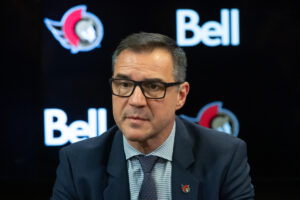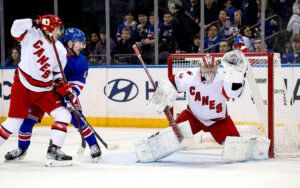We’re on to the third article in our 2018-19 San Jose Sharks season review, covering Sharks head coach Peter DeBoer in this one. Our prior reviews covered the team and the individual players.
There might not be a bigger lightning rod in Sharks territory than DeBoer. He led one of the best rosters in team history to 101 regular-season points and a second-place finish in the Western Conference last year. This was followed by 10 wins in the Stanley Cup Playoffs, eventually being booted out in the Western Conference Final. It is hard to argue with this result, especially with the team’s banged up playoff roster. Yet, critics remain.
DeBoer is an enigma. The Sharks got as far as they should get, even as the coach made troubling choices which hurt the team. There were multiple occasions where DeBoer seemed to fix issues ‘just in the nick of time’.
There are things DeBoer does well, though. He keeps the team on an even keel and has a good feel for what the room needs at any given point in time. There’s no panic in DeBoer and the team has confidence even when the odds are against them. These are characteristics which allowed the Sharks to win a pair of Game Seven’s in this year’s postseason. The systems DeBoer employs are first-rate and it led the Sharks to a defiant season. The team also rarely plays themselves out of a game, instead contending in every game they play.
Reviewing the Coaching of the 2018-19 San Jose Sharks
This 2018-19 San Jose Sharks roster was loaded with talent. If DeBoer had a prime directive for the season it was to make the playoffs with the most rested and healthiest roster possible. He risked this directive repeatedly.
For the seventh consecutive season, the starting goalie for the Stanley Cup champions finished with under 60 regular-season games played. This is DeBoer’s fourth season in San Jose. He’s played Martin Jones at least 60 games in each of the four seasons. Jones finished this season with 62. The odds say do one thing, DeBoer does another. Just as troubling, Jones was overplayed even though he was playing poorly.
The team hit a 10-game slump in March for the second time in three seasons. DeBoer tried to cure the slump by playing sick players (Logan Couture among them) and handing 34-year-old Brent Burns additional minutes. Burns played enormous minutes in the playoffs, which made sense. What didn’t make sense was playing him 27 minutes a night during the Sharks losing streak. A slump is a good time to have younger and less-used players step up. DeBoer refused to go this way.
DeBoer and Five Defenders
Defenceman Joakim Ryan was another DeBoer miss. It’s fair to say Ryan didn’t have a particularly good season but DeBoer played him as if he was a disaster. He would frequently sit Ryan for the second-half games. This taxes the remaining five defencemen more than needed, both within the game and over the course of a season. With the pairings constantly changing to accommodate a five-defender rotation, the Sharks quality of play suffered. In the opening period, while using all six defenders, the Sharks outscored opponents by 17 goals this season. In the final two periods, when DeBoer often went with five defenders, the Sharks outscored opponents by 12 — about one-third the rate.
DeBoer has used a five-defender rotation often in his time in San Jose, especially in the third period. Does it work? The cumulative results show a clear decline in third-period performance. Goal differential, by period, in the DeBoer era is +46 in period one, +35 in period two and +18 in period three.
Coaching and Sharks Injuries
While the coach can not prevent injuries, he can reduce the risks by reducing minutes of key players, especially once a team has effectively clinched a playoff spot. DeBoer instead decided to play with fire and things didn’t work out. Evander Kane and Joe Pavelski carried substantial ice time for most of the season, but in March, they both missed games and neither appeared fully healthy for the playoffs.
DeBoer’s biggest miss came with Erik Karlsson. One can’t blame DeBoer for Karlsson’s initial injury but the coach is the person who decides whether Karlsson plays or sits. Too many times, Karlsson was put back into the line-up when he simply wasn’t healthy.
Some of the blame goes to the player, some to the medical team, but ultimately, it falls on DeBoer to set the right priorities. He didn’t. As a result, Karlsson may have made the initial injury worse, suffering multiple setbacks along the way.
Karlsson’s initial injury occurred in January. He returned to the lineup about a month later. Time to be cautious and limit Karlsson’s minutes? DeBoer says no. In his first three games back, in mid-February, Karlsson averaged over 25 minutes of ice time. He re-injured himself in his fourth game back against the Columbus Blue Jackets. Time to be extra-cautious? Not DeBoer. He had Karlsson in the line-up for the very next game against the Boston Bruins. In the game, Karlsson re-re-injured himself and went to the locker room. Time to be extra-extra-cautious? Nope. Remarkably, Karlsson returned to the bench. DeBoer shockingly gave him another shift and the chance to re-re-re-injure himself. Which is exactly what occurred.
Following the re-re-re-injury, Karlsson was shut down until the final game of the regular season. Too little, too late. The best player on the team was not healthy enough in the playoffs to be the difference-maker he might otherwise have been.
DeBoer consistently went against what was his sole goal at the start of the year: make the playoffs with a healthy roster. He instead compromised this by chasing meaningless points in February and March. This came back to haunt the team come springtime.
DeBoer and the Coaching Staff
DeBoer and his staff failed to fix the dismal power-play throughout the playoffs, the four goals during the five minute major against Vegas was the exception. Outside of the four-goal power play, the Sharks outscored opponents by just six goals (eight power-play goals scored, two shorthanded goals allowed) on their power play over 20 games. That’s really bad. It’s especially bad given the firepower the Sharks have available for their power-plays.
The team also had mediocre results with the penalty kill, ranking tenth among the 16 playoff teams. It failed at key times. For example, the Sharks allowed two power-play goals in the season-ending Game Seven loss to the St. Louis Blues.
During the 2017-18 regular season, the Sharks led the NHL in special teams scoring differential at plus-26. They have the talent to be among the league’s best on special teams. In the playoffs this season, they were a cumulative minus-3 on special teams.
Sharks Early Season Struggles
DeBoer appeared on the brink of losing his job back in early December, with the team mired in a losing streak and severely underperforming relative to the talent. The sense was a loss to the Montreal Canadiens would end DeBoer’s tenure in San Jose. With an unemployed Joel Quenneville, there was a successor capable of taking a strong roster and turning it into an even stronger team. But the Sharks won in Montreal. And continued to win.
Just in the nick of time, the light switch flipped to ‘on’ for DeBoer. The Sharks suddenly went from below average to one of the best in the league. For six weeks, the wins piled up. DeBoer showed he could coach an elite team to elite results. This ended when Karlsson succumbed to his injury, though. Other than the elite six-week stretch, the Sharks were a slightly below-average team over the remainder of the season. If there is a lesson in all of this, it is how important a healthy Karlsson was to the Sharks.
Playoff Complications
The playoffs are an especially complicated way to measure DeBoer. Down 3-1 in the opening series against the Vegas Golden Knights, DeBoer made a gutsy call to stick with Jones in Game 5. Jones was a disaster in the prior three games, giving up 11 goals in only 90 minutes of ice time. The odds Jones would somehow be okay for the next game and the rest of the series were long at best. But again, just in the nick of time, things changed. The long-shot came through and DeBoer deserves credit for the call.
The Sharks won the opening round in unlikely fashion. Jones went from sieve to saint. In Game Six, he saved 58 of 59, setting team records in the process. In period three of Game Seven, just in the nick of time, a five-minute major penalty opened the door for the Sharks to make one of the most improbable comebacks in NHL playoff history and win the series.
The Sharks won the opening round series, but was DeBoer good or lucky?
In the next playoff round, the Sharks once again survived a seven-game series. In the finale against the Colorado Avalanche, just in the nick of time, the Sharks got lucky. A key injury, a bizarre review, and a blown breakaway call all landed in the Sharks favor. The Sharks were good in the series but very fortunate to win. Once again, was DeBoer good or lucky?
Risk Versus Reward
Whether with goalie starts, injuries, or key decisions, too often, DeBoer chose the higher risk, lower reward path. Sometimes the high-risk approach worked, such as sticking with Jones in the playoff series against Vegas. But it usually did not. In areas ranging from injuries, to power plays, to ice time, DeBoer hurt his own team.
The Sharks defied the odds and perhaps this is the thing which is both most positive and most negative about DeBoer. Repeatedly, he stacked the odds against his own team. And repeatedly, the Sharks overcame the odds with gutsy and clutch efforts. Luck in key moments didn’t hurt. The team repeatedly backed itself into a corner and found some way to get out of it, at least until the Western Conference Final.
DeBoer has plenty of positives. He’s led the team to the playoffs in all four of his seasons, winning a total of six playoffs series. The style of game he plays is effective. When players execute it, the Sharks are formidable.
The coach is a lightning rod in large part for the simplest of reasons. Sharks fans have had playoff success, but not a Stanley Cup. Stanley Cups are won when very good talent is coached to play at elite levels at the right time of year. This season, DeBoer took an elite roster and got a very good result. The Sharks didn’t severely underachieve but it also feels like they didn’t take their best shot.
DeBoer has an enviable record as Sharks coach. And yet, it always feels like he’s left something big on the table.
Main Photo:






